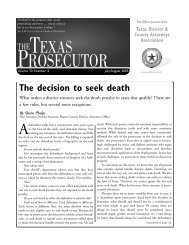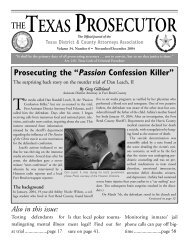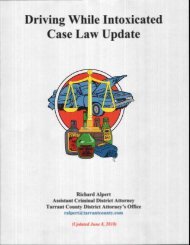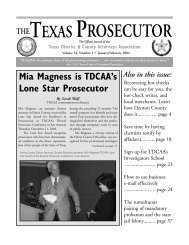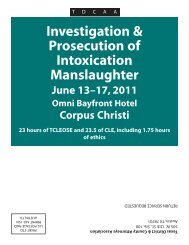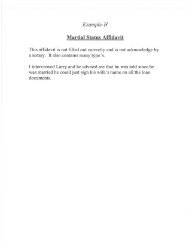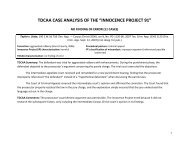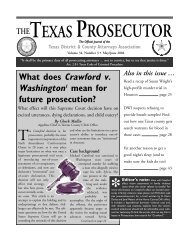Driving While Intoxicated Case Law Update - Texas District ...
Driving While Intoxicated Case Law Update - Texas District ...
Driving While Intoxicated Case Law Update - Texas District ...
You also want an ePaper? Increase the reach of your titles
YUMPU automatically turns print PDFs into web optimized ePapers that Google loves.
Biqon v. State, 252 S.W.3d 360 (Tex.Crim.App.2008).<br />
Defendant objected to the state expert's testimony concerning the conversion of appetlant's serumalcohol<br />
levelto a blood-alcohol level and retrograde extrapolation on fhe basrs that said testimony<br />
was not reliable. The Court of Appeals held both were admissible. The Court of Criminal Appeals<br />
held that it was not an abuse of discretion to allow said testimony.<br />
Reidweq v. State, 981 S.W.2d 399 (Tex.App.-San Antonio 1998, pdr. ref'd).<br />
Objection to admitting evidence of serum-blood fesf as opposed to whole blood test overruled as<br />
evidence showed that test instrument was standardized such that serum-blood fesf resu/f would<br />
be the same as if whole blood were tested.<br />
l. HOSPITAL DRAWN SAMPLE = NOT AN ASSAULT<br />
Hailey v. State, 87 S.W.3d 118 (Tex.Crim.App.2002) cert. denied, 538 U.S. 1060 (2003).<br />
Defendant arrested for DWl. The evidence at the time of arresf showed that defendant was: 1)<br />
Bouncing off guardrail; 2) Crossing into oncoming traffic; 3) PBT administered atthe scene showed<br />
an alcohol concentration of .337. Officer, fearing there may be Alcohol Poisoning transported<br />
defendanttothe hospital. Defendantwas read the DIC-24 and refused to give a sample. Hospital<br />
drew a medical sample that showed a .454. Court of Appeals held that blood was illegally taken<br />
and that the taking of the blood sample constituted an assault on the defendant by the hospital<br />
personnel. The problem was that no wifness was called from the hospital to say why the blood was<br />
taken. The Court of Criminal Appeals held that it was improper for the Court of Appeals to<br />
reverse fhe case based on a theory not presented to the trial court (that being the hospital<br />
assault issue) and so reversed the Court of Appeals decision affirming the trial court's<br />
finding that the blood sample was admissible.<br />
Spebar v. State, 121 S.W.3d 61 (Tex.App.-San Antonio, September 3, 2003, no pet.).<br />
Another case where the blood sample was drawn by hospital personnel after the defendant refused<br />
to give the police a sample. As in the case above, the defendant claims the evidence was<br />
inadmissible because it was obtained when the hospital illegally assaulted him. This claim was<br />
rejected by the Trial Court. The defendant cites the Court of Appeals opinion in the Hailev case.<br />
The Court first distingur.shes Hailey by pointing out that the trial judge in its ruling stated that this<br />
was not a case of law enforcement taking a blood sample but rather blood taken as part of the<br />
defendant's medicaltreatment. The Courtfurther rejectsthe defendant's argumentthatthe hospital<br />
personnel were agents of the Sfafe.<br />
J. ACQUIESCENCE TO HOSPITAL BLOOD DRAW = GONSENT<br />
State v. Kellv, 204 S.W.3d 808 (Tex.Crim.App., 2006).<br />
ln response to the objection to the admissibility of a medical blood draw where the defendant<br />
99



